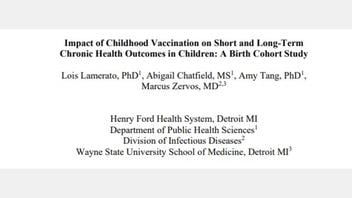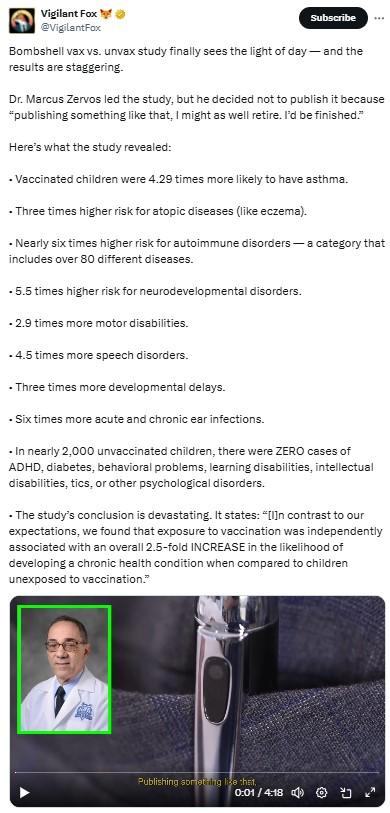
Did the Henry Ford Health system withhold from publication a study that compared the health of vaccinated and unvaccinated children, despite that study being statistically sound? No, that's not true: medical research experts reviewed the data and found a mismatch between comparison groups that made comparisons invalid. The Henry Ford Health system said its internal review of the draft paper co-written by one of its doctors identified fatal flaws with the data and methodology that made conclusions meaningless. A Stanford medical researcher said the only thing the study proves is that the study's two groups of children can't be compared because they're not a valid match-up.
Claims that the study was valid appeared in an October 12, 2025 post on the @VigilantFox account on X (archived here) which included this quote from the draft paper:
"[I]n contrast to our expectations, we found that exposure to vaccination was independently associated with an overall 2.5-fold INCREASE in the likelihood of developing a chronic health condition when compared to children unexposed to vaccination."
Here's what the post on X looked like at the time this fact check was written:

(Image source: Lead Stories screenshot of post at x.com/VigilantFox.)
Lead Stories reached out to Dr. Marcus Zervos, the infectious disease expert at Henry Ford Health who led the team that produced the draft paper. Titled: "Impact of Childhood Vaccination on Short and Long-Term Chronic Health Outcomes in Children: A Birth Cohort Study", it was entered into the record (archived here) of a U.S. Senate committee taking testimony vaccine dangers.
Vaccine skeptic Del Bigtree, who has produced a film about the study, claims it was he who convinced Zervos to do the study by mining the Henry Ford Health system's data on its patients.
Henry Ford Health, the Michigan-based hospital and healthcare system, on October 13, 2025 posted a rebuttal of claims (archived here) made in the film, writing on its website:
...This draft did not prove anything...
The draft wasn't submitted for publication or shared with the public because the data and analyses were flawed, and it's irresponsible to share scientifically flawed studies with the public...
...Reputable academic medical research institutions like Henry Ford Health subject research papers to stringent, internal, and scientific scrutiny that often points out issues with data, methodology or other flaws. It's rare that a paper makes it to the scientific journal submission phase, and even rarer that papers get published. This wasn't hidden; it was simply rejected for scientific lapses...
That statement was a follow-up to a September 26, 2025 post on the Henry Ford Health website, rebuting claims that the study was suppressed for political reasons:
The draft was never considered for submission to journals because it did not remotely come close to meeting the rigorous scientific standards the system demands--the same standards journals have, too. Claims that Henry Ford Health kept or suppressed the results from the public due to political reasons are patently false, defamatory and troubling; it's important the public receives the truth, as this may lead to families making health decisions based on unfounded and incorrect assumptions.
Dr. Jake Scott, a Stanford professor in the Division of Infectious Diseases, testified about the problems with the study at the September 9, 2025 hearing of the U.S. Senate Permanent Committee on Investigations.
The Henry Ford analysis highlighted by some is an example of why vaccinated versus unvaccinated studies are especially prone to bias.
These designs often compare groups that differ in many fundamental ways unrelated to vaccines, including how often they seek care and how long they remain under observation.
After members of the U.S. Senate praised the unpublished study, Scott wrote this on his personal Substack page (archived here) that he had personally reviewed the study:
The analysis followed approximately 18,500 children from Henry Ford Health System, comparing 16,500 vaccinated to 2,000 unvaccinated children. It reported that vaccinated children had 2.5 times higher rates of chronic disease overall, with some conditions showing 3-to-6-fold increases.
These alarming numbers collapse under scrutiny.
The problems begin with the groups being fundamentally incomparable. Every baseline characteristic differed significantly between vaccinated and unvaccinated children: sex, race, birth weight, prematurity, respiratory distress, birth trauma.
The magnitude of these baseline imbalances suggests these groups likely differ on unmeasured factors too: socioeconomic status, parental age, environmental exposures, urban versus rural residence. Detroit's well-documented pollution and water quality issues could vary dramatically by neighborhood.
When your starting differences mirror your ending differences, you haven't shown vaccines cause disease. You've just shown your groups aren't comparable.
Lead Stories reached out to Henry Ford Health to request copies of its expert internal reviewers' critiques of the study, a copy of the initial study plan and to repeat our request to interview Zervos, who is still listed as a staff physician. We will update this fact check when they provide any of those items.















